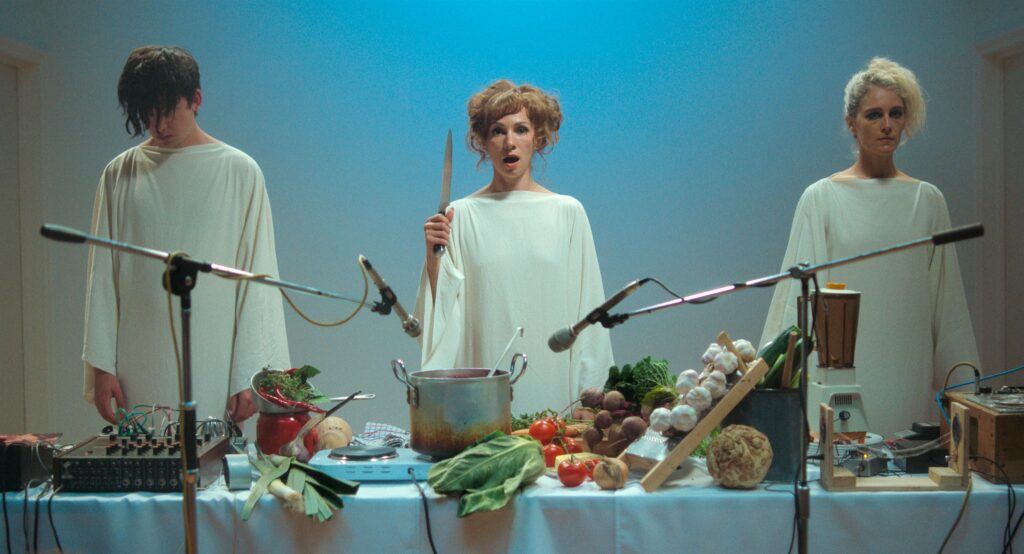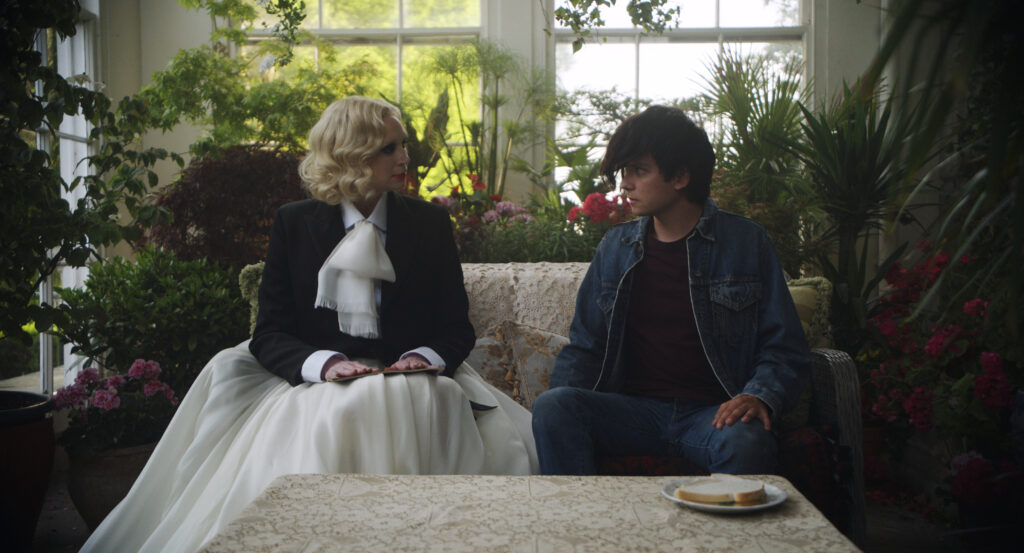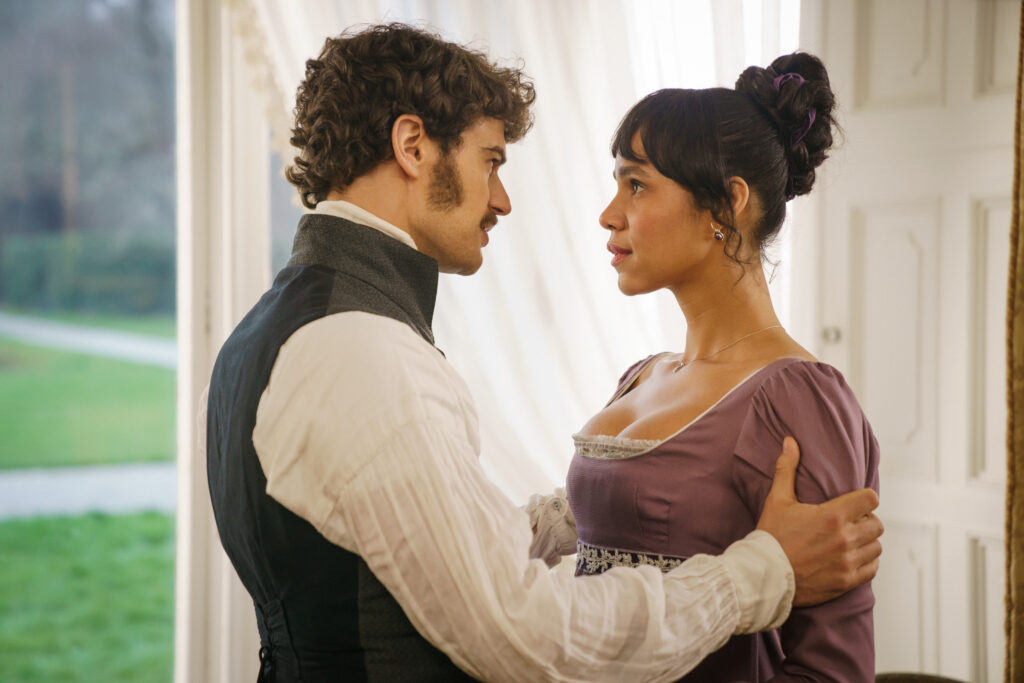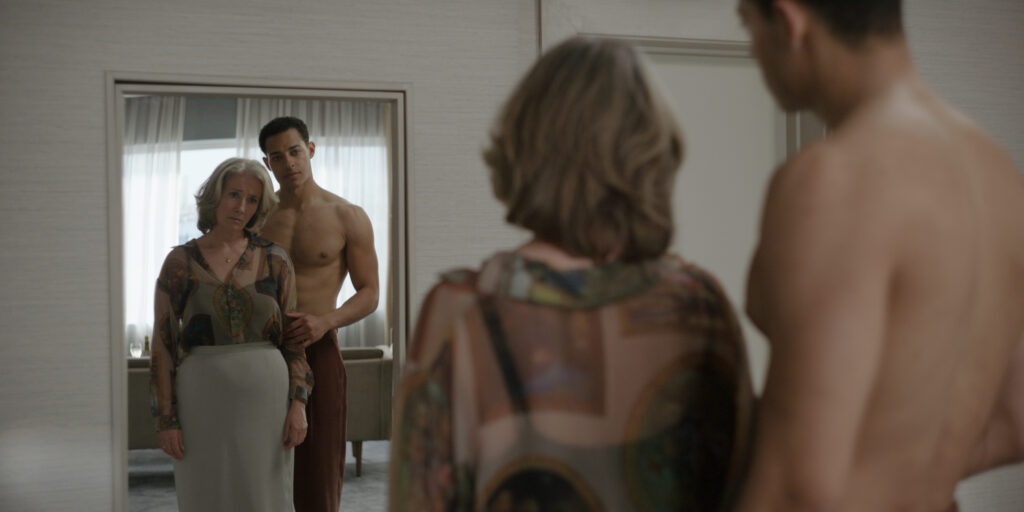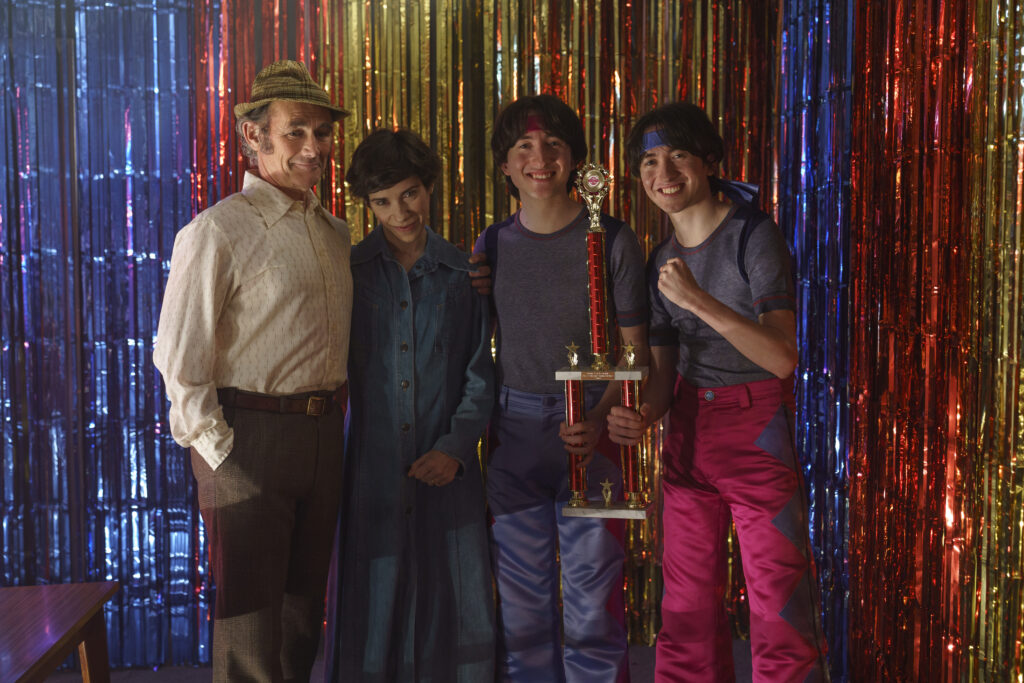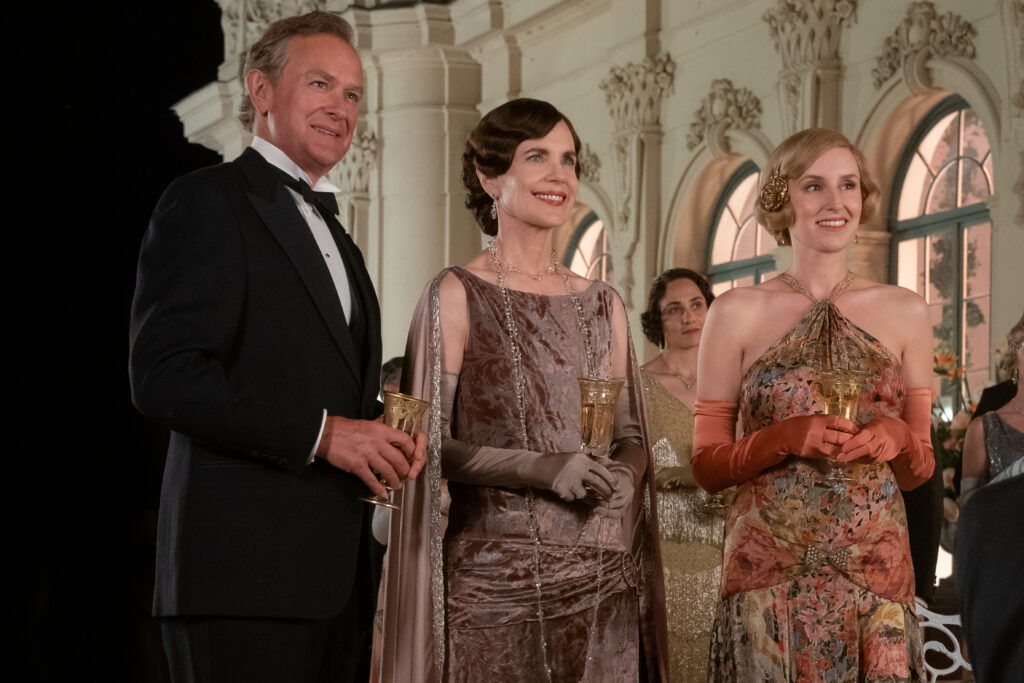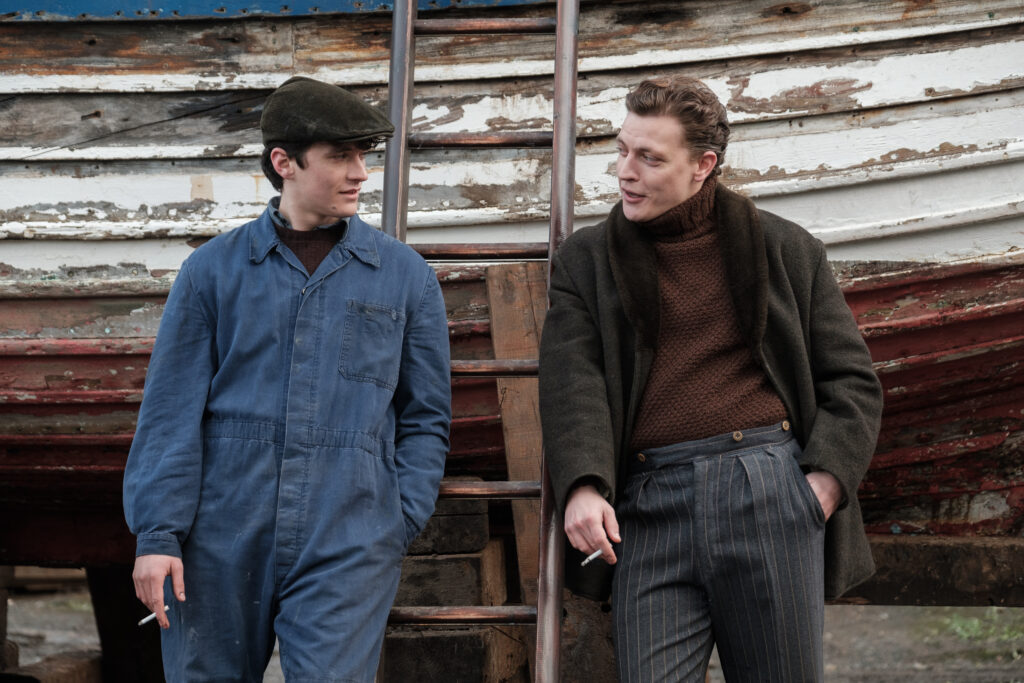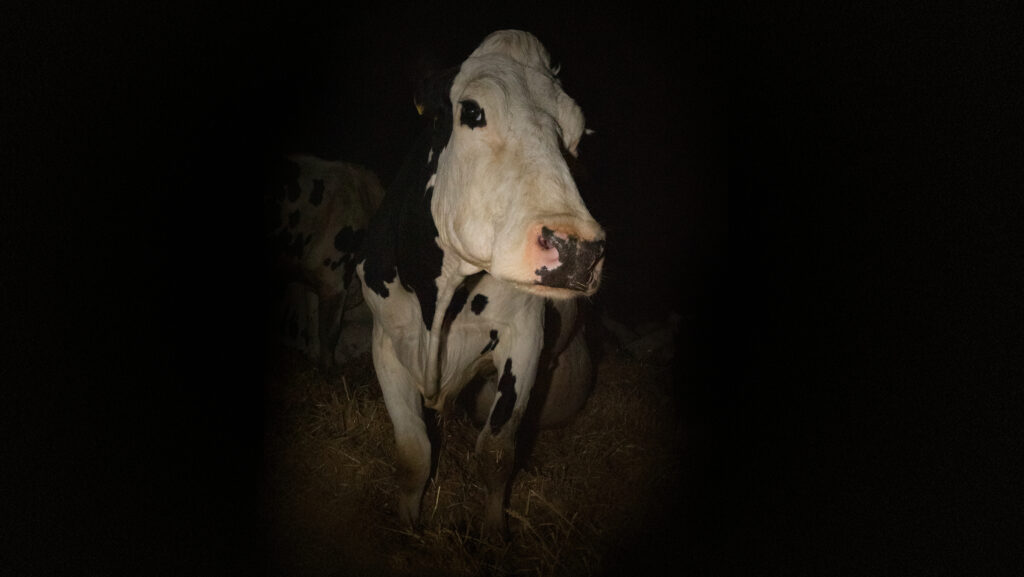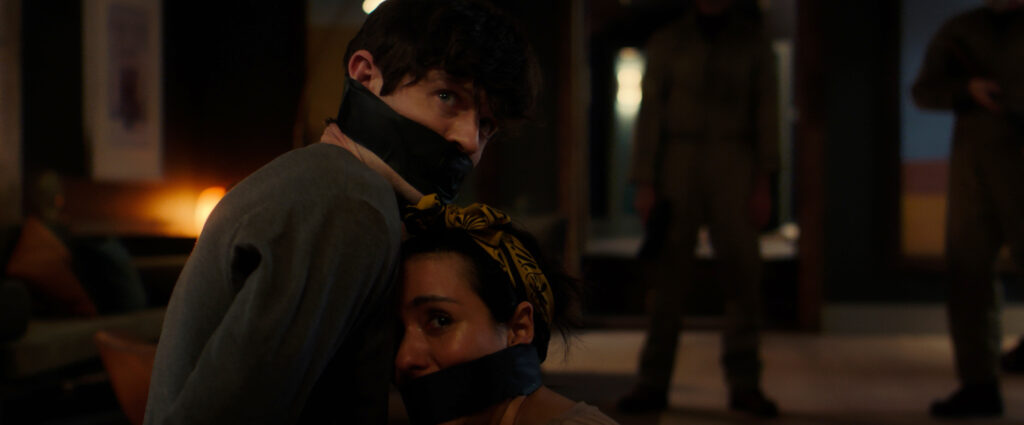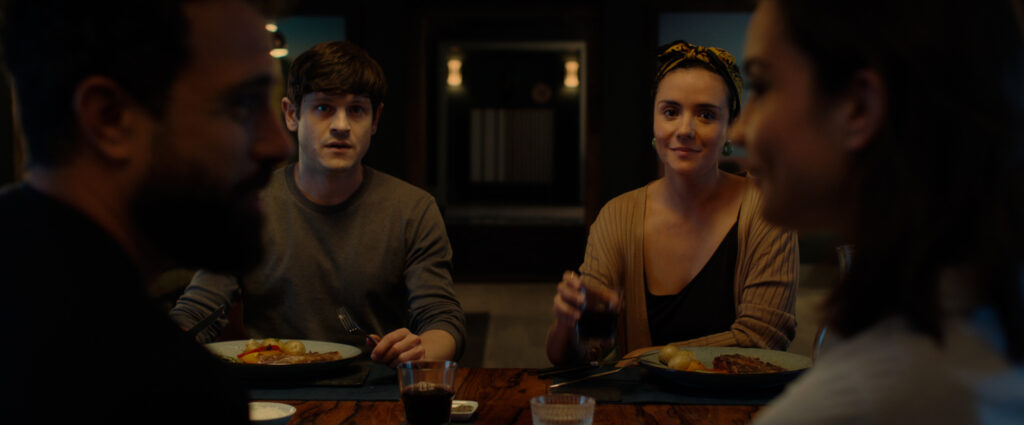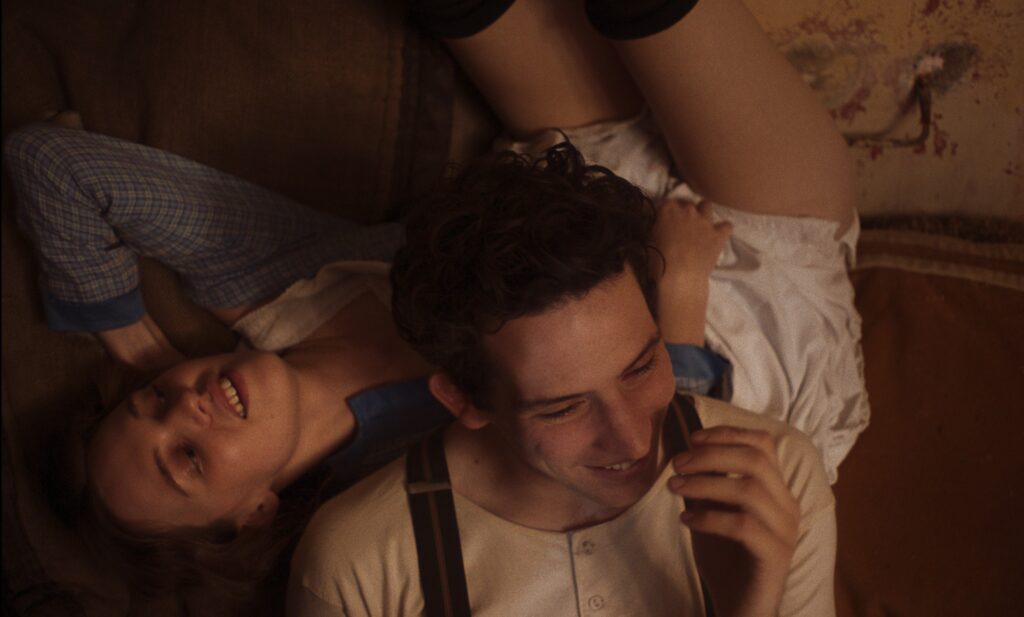July 23, 2022
by Carla Hay
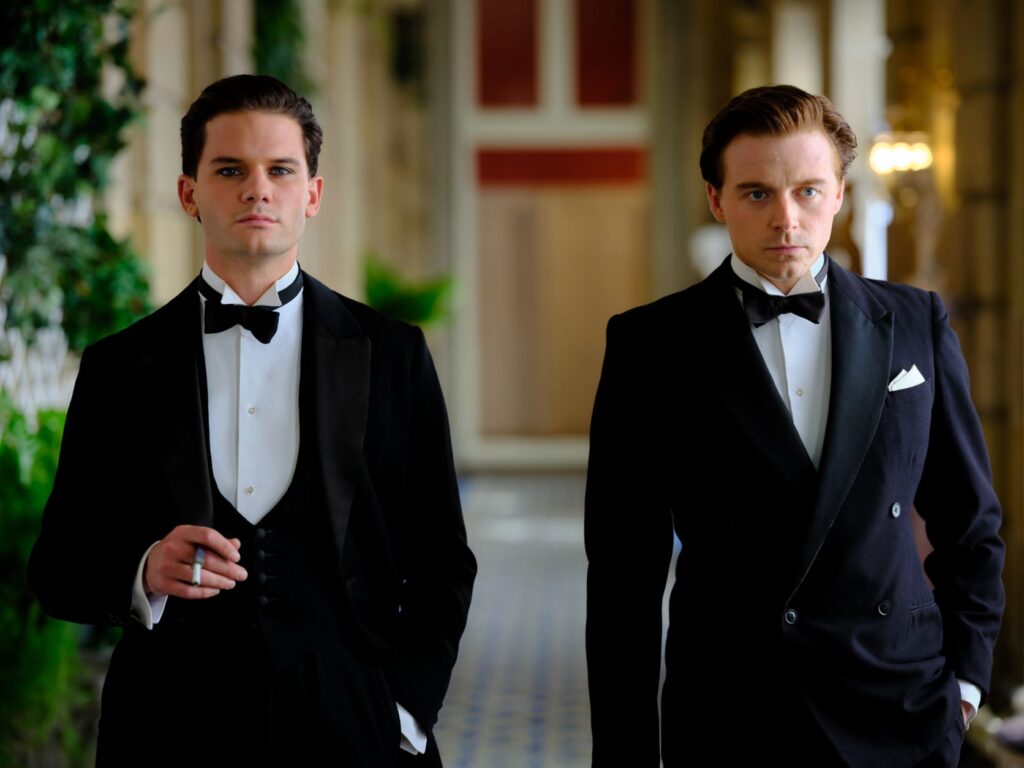
Directed by Terence Davies
Culture Representation: Taking place from the 1910s to 1950s, primarily in England, the dramatic film “Benediction” features a nearly all-white cast of characters (with one African person) representing the working-class, middle-class and wealthy.
Culture Clash: During World War I, British soldier Siegfried Sassoon becomes an anti-war objector and a poet, and for years he hides his homosexuality, including by getting married to a woman.
Culture Audience: “Benediction” will appeal primarily to people who are interested in true stories of British gay men in the 20th century.

Well-acted but slightly long-winded, the British drama “Benediction” is a compelling biopic that shows how poet Siegfried Sassoon was not only bold and outspoken about his anti-war views, but he was also insecure and secretive about his homosexuality. The movie gives emotionally complex depictions of how fame cannot shield LGBTQ people from the bigotry that pressures LGBTQ people to sometimes lead double lives. “Benediction” is a 20th century period drama, but many of the movie’s issues about homophobia can still apply to many people today. Written and directed by Terence Davies, “Benediction” had its world premiere at the 2021 Toronto International Film Festival.
In real life, Siegfried Sassoon had turmoil not just about his sexuality but also about his religious faith and coming from a broken home. Born in Matfield, England, in 1886, Siegfried died in Heytsebury, England, at age 80 in 1967, just one week before he would have turned 81. His father Alfred was Jewish, and his mother Theresa was Catholic. Alfred was disowned from his family for marrying a non-Jewish woman.
When Siegfried was 4 years old, his parents separated. Siegfried (who was the middle of three sons) and his older brother Michael and younger brother Hamo were then raised by their mother, while their father would see them for visits. And then, Alfred died of tuberculosis in 1895, when Siegfried was 7 or 8 years old. Years later, tuberculosis would nearly kill the man who was considered to be the greatest love of Siegfried’s life.
“Benediction” would have benefited from some exploration of Siegfried’s childhood and family background, which undoubtedly shaped the person he became. It would certainly explain why Siegfried wasn’t afraid to go against society’s expectations as a military man who became an outspoken objector against war and against the British government. Siegfried lived during a time in the United Kingdom when it was very taboo for people to be in mixed-religion marriages and for married people to separate. Being treated like an “outsider” simply because of his parents’ marital situation no doubt affected Siegfried in ways that carried into his adulthood.
Instead of giving this backstory, “Benediction” shows Siegfried in two different phases of his life: when Siegfried was his 30s and 40s (played by Jack Lowden) and when Siegfried was in his 70s (played by Peter Capaldi), with the younger phase of Sisgfried’s life getting most of the screen time. This uneven timeline doesn’t ruin “Benediction,” but it does make it more obvious to viewers how the movie under-uses the talent of Capaldi.
“Benediction” opens in London in 1914. Siegfried and his younger brother Hamo (played by Thom Ashley) are visiting a tailor shop together. In 1914, Siegfried was an aspiring poet and a British Army soldier who would later become a second lieutenant and a decorated war hero for saving soldiers’ lives during combat. When Hamo goes off to serve in the British Army during World War I, Siegfried expresses regret at not saying goodbye to his brother. Hamo was tragically killed in the line of duty during the Gallipoli Campaign in 1915.
By 1917, Siegfried became disillusioned about World War I and war in general. The movie shows him writing letters of protest to the United Kingdom government. A scene in “Benediction” shows him reading one of the letters, which says in part: “I believe that war upon which I entered in defense and liberation has now become a war of aggression and conquest.”
As an example of Siegfried’s willingness to sacrifice his military career for his anti-war beliefs, he meets with an openly gay journalist/mentor named Robbie Ross (played by Simon Russell Beale), who comes from an influential political family, to find out what punishment Siegfried will be getting from the British government. In this meeting, Siegfried is fully expecting to hear that the British military is going to court martial Siegfried because of Siegfried’s public criticism of the British government’s stance on World War I. But to Siegfried’s dismay, Robbie tells Siegfried that Robbie enlisted the help of Edward Marsh, the principal private secretary of then-U.K. minister of munitions Winston Churchill, to get Siegfried honorably discharged from the military for medical reasons.
“You robbed me of my dignity!” Siegfried angrily says to Robbie about not getting court martialed. Robbie says, “Don’t be angry with me, Siegfried. My intentions were honorable.” Despite this argument, Robbie (who is 18 years older than Siegfried) and Siegfried remain friends. Robbie became a trusted advisor in Siegfried’s personal and professional lives. “Benediction” briefly mentions later in the movie that Robbie was also known for his close relationship with gay poet/writer Oscar Wilde, whom Robbie remained loyal to during Wilde’s imprisonment for being gay.
At the time, homosexuality was banned in the British military, and homosexuality was considered a psychiatric disorder. “Benediction” makes it look like although Siegfried might have been suspected of being gay in the military, he was punished more for speaking out against the British government. His military discharge included being sent to a psychiatric hospital for having “psychiatric problems.”
In a dramatic show of his disgust with the British military, Siegfried throws away his military card. At the hospital, he has therapy sessions with a sympathetic psychiatrist named Dr. Rivers (played by Ben Daniels), who says things to Siegfried such as: “It’s not about what I want. It’s about what you think you need.” It’s not said out loud, but it’s implied that Dr. Rivers is a closeted gay man too.
Over time, Siegfried begins to trust Dr. Rivers because he and the doctor are kindred spirits who both have a lot of mistrust of the British government. Siegfried witnesses some disturbing things in the hospital, such as a man screaming out on agony during a meltdown, but Dr. Rivers is able to calm Siegfried’s fears. During his stay in the psychiatric hospital, Siegfried befriends a fellow patient named Wilfred Owen (played by Matthew Tennyson), who is the editor of a poetry newsletter called The Hydra.
Siegfried and Wilfred become great admirers of each other’s poetry. Siegfried is particularly impressed with Wilfred’s poem “Disabled.” It looks like Siegfried and Wilfred are headed toward a romance. But that possibility is interrupted when a chief medical officer (played by Julian Sands) has an angry reaction to seeing Siegfried and Wilfred doing a tango dance together. What happens to Wilfred is shown in the movie.
“Benediction” spends a lot of time depicting the ups and downs of Siegfried’s love life. People closest to Siegfried knew he was gay, but he was still “in the closet” about his true sexuality to most people. “Benediction” implies that Siegfried probably would’ve been more open about his sexuality if there weren’t severe punishments for being gay in the United Kingdom at the time.
Despite hiding his sexual identity from many people, Siegfried had an active social life. The movie shows Siegfried, Robbie and their mutual friend Dorothy Brett (played by Georgina Rylance) being invited to a party by Lady Edith Oliver (played by Olivia Darnley), one of the high-society people who became acquainted with Siegfried because of his poetry. It’s at this party that Siegfried meets celebrated actor/composer Ivor Novello (played by Jeremy Irvine), who is an openly gay playboy.
Siegfried falls for Ivor’s charms but quickly finds out that he’s one of many of Ivor’s lovers who get tossed aside and picked up again, according to Ivor’s whims. In fact, when Ivor and Siegfried hook up for the first time, Ivor’s actor boyfriend Glen Byam Shaw (played by Tom Blyth) walks in on them. Ivor cruelly tells Glen to leave the house keys as a way to break up with Glen in that moment
“Benediction” portrays Siegfried’s on-again/off-again relationship with Ivor as not so much of a romance but more like an addiction that Siegfried finds hard to quit. Ivor is up front with his lovers in telling them that he doesn’t believe in monogamy. And this is how Ivor describes his views about love: “The main drawback about love is that it descends all too quickly into possessiveness. It really is a bore.”
Ivor doesn’t like Siegfried’s friend/mentor Robbie. Siegfried’s mother Theresa (played by Geraldine James) doesn’t like Ivor. Theresa has this to say about Ivor: “He’s amusing but unpleasant.” Is it any wonder that Siegfried’s relationship with Ivor is doomed to fail?
In a scene that looks fabricated for a movie, Ivor’s ex-lover Glen happens to see Siegfried and Ivor break up at a restaurant. It should not come as a big surprise that after seeing this breakup, Glen immediately wants to get close to Siegfried. Glen offers to drive Siegfried to Kent so that Siegfried can visit his grandmother. During this trip, the two men get to know each other better in more ways than one. However, Glen eventually decides he’s going to marry an actress.
“Benediction” portrays aristocrat Stephen Tennant (played by Calam Lynch) as the biggest love of Siegfried’s life. However, Stephen and Siegfried’s love affair is plagued by mutual jealousy. Even when Ivor was no longer dating Siegfried, Ivor seems to still have some kind of hold over Siegfried. And it bothers Stephen immensely. Siegfried also gets jealous of the attention that Stephen gets from other men. This love affair also ends in heartbreak.
In his 40s, Siegfried strikes up a close friendship with a lively and outgoing socialite named Hester Gatty (played by Kate Phillips), despite Hester being 20 years younger than he is. Hester knows that Siegfried is gay. Siegfried also confides in Hester about problems in his love life.
And eventually, Hester proposes marriage to Siegfried, knowing that she will be his “beard,” to cover up the fact that he is gay. Siegfried and Hester get married in 1933, mainly because they want to start a family together. Their son (and only child) George was born in 1936.
Where does the story of older Siegfried fit into the movie? It’s told in the context of an emotionally unsettled Siegfried fighting depression and looking back on his life while deciding that he’s going to convert to Catholicism. Siegfried’s adult son George (played by Richard Goulding) is very skeptical about Siegfried being committed and sincere about being a Catholic. It leads to some father/son conflicts that aren’t very interesting, mainly because viewers never get to see what kind of father Siegfried was to George for most of George’s life.
As for older Hester (played by Gemma Jones), living in a fake marriage has taken a toll on her. The young Hester was hopefully optimistic that being married to her gay best friend would have a happy ending. The older Hester is somewhat bitter because she sees the reality that although she is happy with being a mother, she and Siegfried deprived themselves of living authentically and possibly being in a true romance with someone else. Hester also knows that this arranged marriage benefited Siegfried more than it benefited her.
However, that doesn’t mean Siegfried feels any more satisfied than Hester in how this marriage turned out to be a stagnant relationship. Siegfried and Hester just barely tolerate each other but feel obligated to stay together to keep up appearances during a time when divorce was still a big stigma for many people. Siegfried wanting to convert to Catholicism is an obvious indication that he doesn’t consider divorce to be an option for this unhappy marriage.
There’s not a bad performance in “Benediction,” with Lowden being an obvious standout for his portrayal of the complicated and somewhat unpredictable Siegfried. Irvine also gives a memorable supporting performance as heartbreaker Ivor, who seems to have love/hate relationships with most people in his life. Jones and Capaldi also give admirable and nuanced performances as the older Siegfried and older Hester in the limited screen time that they have.
In a movie about a famous poet, the writing should also be commendable. “Benediction” has snippets of Siegfried’s poetry, of course, but the movie delivers a lot of above-average and snappy dialogue from Davies’ original screenplay. In a scene where Siegfried finds out that Ivor is dating actor Bobby Andrews (played by Harry Lawtey) at the same time that Ivor has been dating Siegfried, Bobby quips: “If you want fidelity, Siegfried, buy a pet.” (In real life, this actor spelled his name as Bobbie Andrews.) Later, when Glen tells Siegfried that he’s marrying a woman, Glen cynically says: “Purity is like virginity. As soon as you touch it, it becomes corrupt.”
“Benediction” unquestionably has high-quality filmmaking, when it comes to the movie’s acting, production design and costume design. However, “Benediction” doesn’t quite have what it takes to win major awards for any aspects of its filmmaking. The biggest issue is that parts of the film tend to lumber and could have used better editing.
There’s also the problem of introducing Siegfried at a later stage of his life and yet not giving that period of his life enough screen time. The movie leaves out huge parts of Siegfried’s life after he married Hester. These omissions just bring up many questions that “Benediction” never answers.
“Benediction” also doesn’t adequately explain what motivated Siegfried to convert to Catholicism at this stage in his life. There are hints that he was ashamed of his sexuality and wanted to atone for it in a religion that condemns homosexuality, but that interior reasoning is never fully explored in the movie. And for a very manipulative reason (which won’t be revealed in this review), “Benediction” fabricates a story arc near the end of the film about Siegfried becoming a widower. In real life, Hester Sassoon died in 1973—six years after Siegfried’s death.
Viewers might also question if “Benediction” glosses over or ignores a lot of the abusive homophobia that Siegfried might have experienced in his personal life. Except for being put in a psychiatric institution (where “Benediction” shows he was treated pretty well and was lucky enough to have an understanding doctor), Siegfried was never imprisoned, tortured, bullied or fired for his sexuality, if you believe everything in this movie. It might be a testament to Siegfried having certain privileges (fame and high-society friends) that lesser-known and less-privileged gay men didn’t have as protection against homophobic cruelties.
Despite these narrative flaws, “Benediction” is worth seeing for a fascinating portrait of a highly talented artist, what he went through in leading a double life, and the price he and his loved ones had to pay as a result. Viewers who are inclined to think arthouse British period dramas can be too stuffy probably won’t like “Benediction” too much. But for people who enjoy or who are open to this type of entertainment, then “Benediction” is a biopic that will satisfy those cinematic tastes.
Roadside Attractions released “Benediction” in select U.S. cinemas on June 3, 2022. The movie was released in the United Kingdom on May 20, 2022, and in Australia in 2021.

